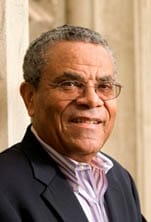Educational Studies Prof. Carl Cohn leads high-profile study into Washington, D.C. school reforms
School of Educational Studies Professor Carl Cohn has just completed work on a highly-anticipated study examining the effectiveness of sweeping reforms of the Washington, D.C. public school system.

The study, released in June, was conducted by a National Research Council (NRC) committee co-chaired by Cohn.
A 2007 law known as the Public Education Reform Amendment Act (PERAA) gave control of the District of Columbia’s public schools to the mayor and made other changes in school governance. The law’s purpose was to allow leaders flexibility so they could make bold changes to improve a school system that had been performing poorly for decades.
The NRC report found that despite some improvements, there are still disparities in academic progress and learning opportunities among students groups and across D.C.’s wards.
“Progress has been made in D.C. but there’s still a lot of work to be done,” Cohn said. “Youngsters in all wards and all parts of the city need to benefit from the school improvement efforts that captured national headlines. That currently isn’t the case.”
According to the 340-page report, areas of improvement include better math and reading proficiency among students and higher scores on standardized tests as well as increased efficiency in cycling out teachers who do not perform well according to the district’s teacher-evaluation tool. However, other areas the report has detailed as still needing work mitigate these advances.
“[B]lack and Hispanic students, those with disabilities, those eligible for free or reduced-price lunches, and English-language learners are much more likely to be in the lowest performance categories than other students,” says the report, which identifies graduation rates in the city as “disturbingly low.”
As the operating arm of the National Academy of Sciences and the National Academy of Engineering, the NRC works to improve government decision making and public policy, increase public understanding, and promote the acquisition and dissemination of knowledge in matters involving science, engineering, technology, and health. Its independent, expert reports and other scientific activities inform policies and actions that have the power to improve the lives of people in the U.S. and around the world.
Cohn’s decades of experience in educational leadership and reform garnered his appointment to a leadership position on the council.
He is the co-director of the Urban Leadership Program at CGU. He served as the superintendent of schools for the San Diego Unified School District from 2005 to 2007 and as the superintendent of schools for the Long Beach Unified School District from 1992 to 2002. During his leadership in Long Beach, the district achieved record attendance, the lowest rate of suspension in a decade, decreases in student failure and dropout rates, and an increase in the number of students taking college preparatory classes. In 2011, California Governor Jerry Brown appointed him to the State Board of Education, and he completed his term in January of this year.
He also currently serves on the Spencer Foundation board and is the chair of the ACT, Inc. board in Iowa City, Iowa
More information on the report is available on the National Academies website.